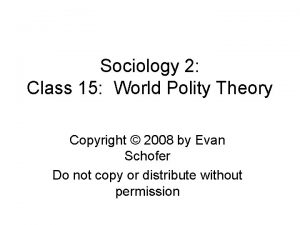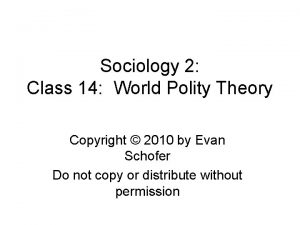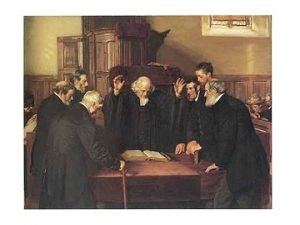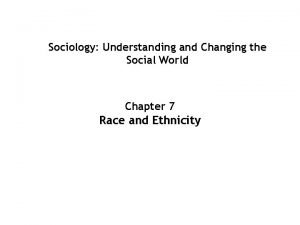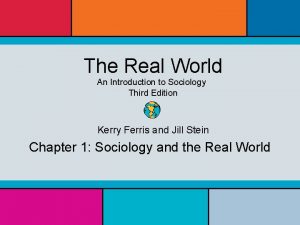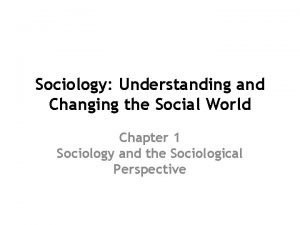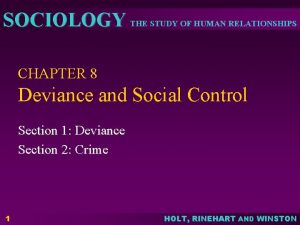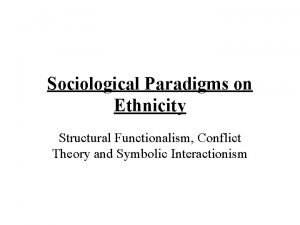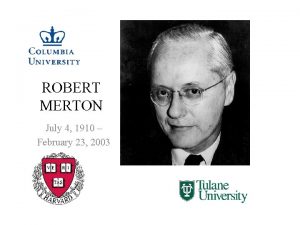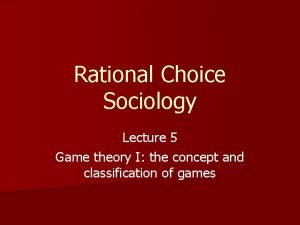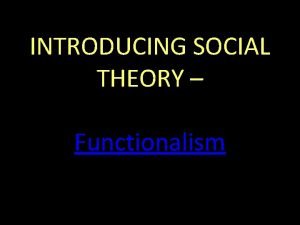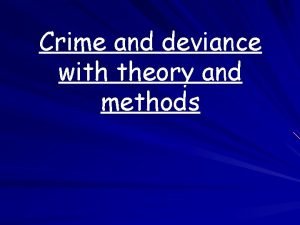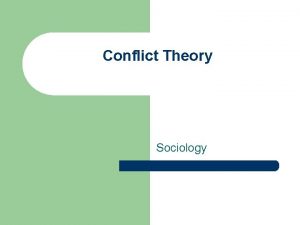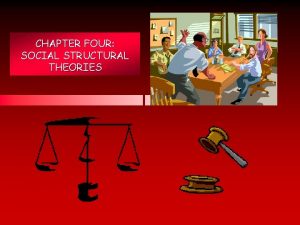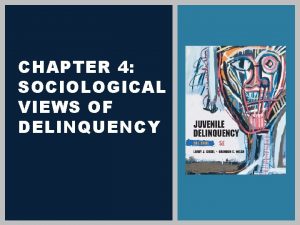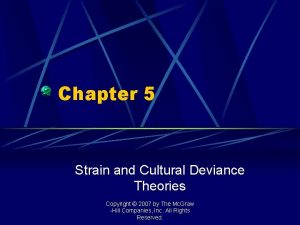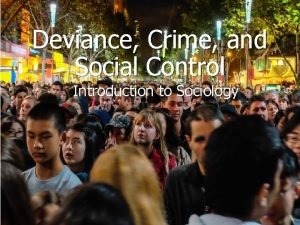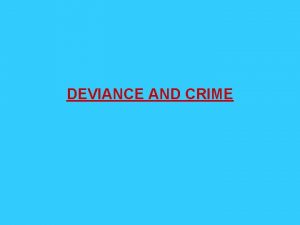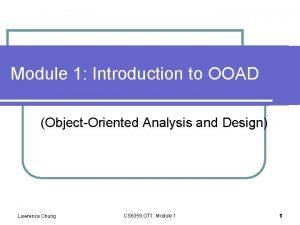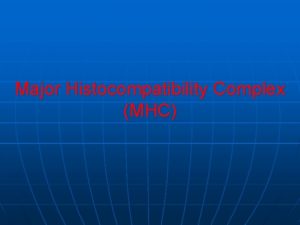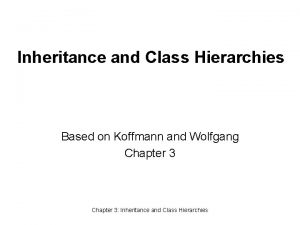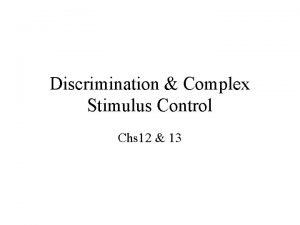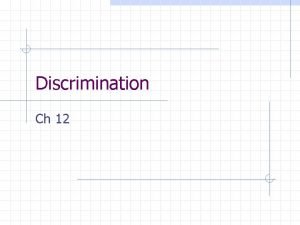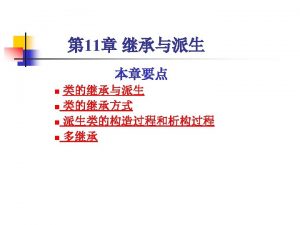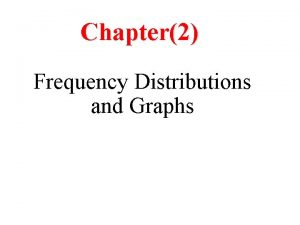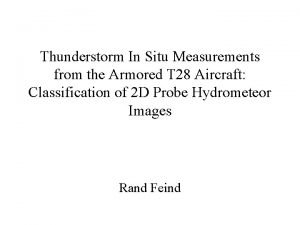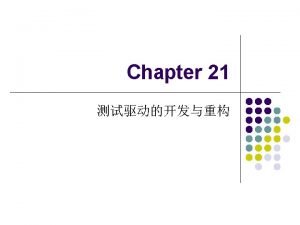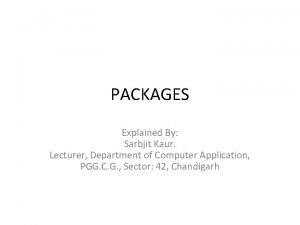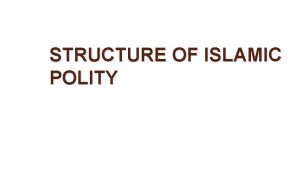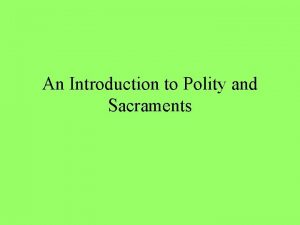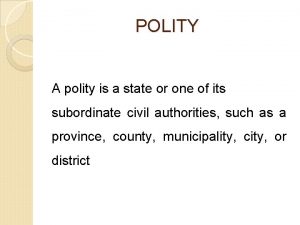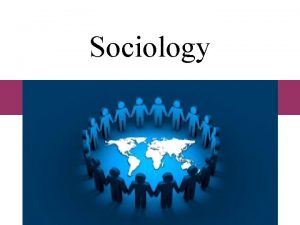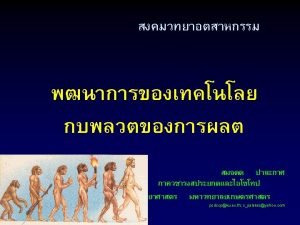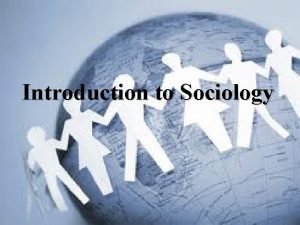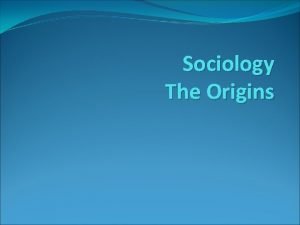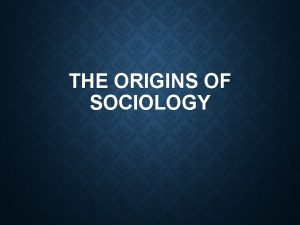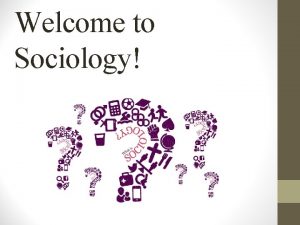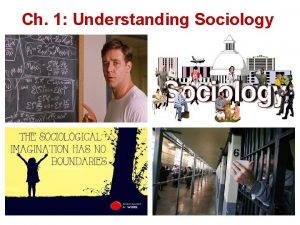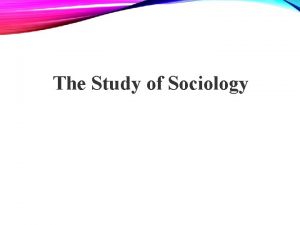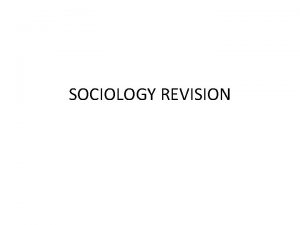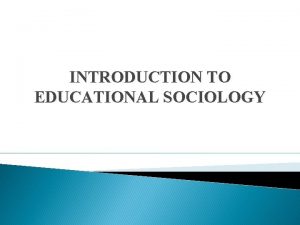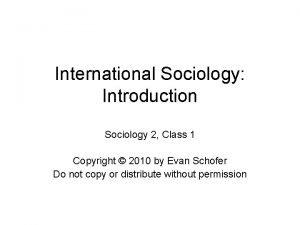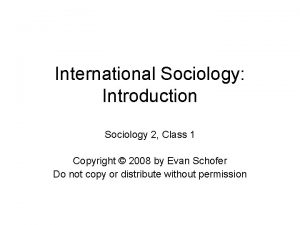Sociology 2 Class 14 World Polity Theory Copyright







































- Slides: 39

Sociology 2: Class 14: World Polity Theory Copyright © 2010 by Evan Schofer Do not copy or distribute without permission

Announcements • Announcements: • Exams graded • Will be returned in section next week • Today’s Class: • Wrap up World-System Theory (WST) – Also called “dependency” theory • World Polity Theory (WPT) – Also called “Neo-institutional” theory “institutional” theory, or “world society theory”

Review: Theories of Globalization • General perspectives on the economy • Adam Smith • Marx • Keynesianism • Sociological theories • Modernization theory • World Systems Theory (WST) / dependency theory • World polity theory (WPT) / institutional theory • Political Science • Realism • Institutionalism (Political science) / Interdependence • Constructivism.

Review: Modernization Theory • Argument: All societies naturally pass through certain stages of development • All societies start out as “traditional” economies – Based on subsistence farming, hunting/gathering, etc • Then, they have an “industrial revolution” • Eventually, they become “modern” high-tech societies • Modernization involved multiple shifts: • Economy: Shift to higher levels of industrialization • Institutions: Rise of modern government, legal systems, education systems, etc. • People: Creation of “modern” persons – Shift away from “traditional values”, toward science, etc…

Review: Modernization Theory • Criticisms: – 1. It is very “Eurocentric” / Western-centric • Assumes that the West represents the ideal • De-values other societies, cultural traditions – 2. Modernization theory focuses on a single country, ignores global dynamics • Assumes that success/failure is due to internal factors – Rather than relation to others: domination & competition – 3. Modernization theory is unable to explain the persistent poverty found in many countries.

Review: World-System Theory (WST) • Key Definitions: • Core: the rich, developed countries • Also: west; metropolitan countries; developed world • Periphery: poor, dependent nations • Also: underdeveloped countries; satellites; dependencies • Semi-periphery: semi-industrialized countries • Dependency: The vulnerable state of being exploited by core countries • They depend on the core for trade, investment, loans, technology, etc. (related term: underdevelopment).

Review: World-System Theory (WST) • World-System Theory: We need to study the entire global economy as a world system • We can’t understand the fate of a single country, without understanding how it fits into the overall system • Countries are rich or poor because of their position relative to others in the global capitalist system. • Argument: Europe (the “core) was able to prosper by exploiting resources from other places • The great success of Europe and the failures in the non-West weren’t just a coincidence… • Europe became wealthy by maintaining economic & military dominance over other nations • Exploited nations will never “modernize” as long as they are oppressed by Western nations.

Review: World-System Theory (WST) • Question: How does WST differ from other analysis of economic globalization? • Both agree that economics = important – But, economists often view the world economy positively (or neutrally) • Ex: Ricardo thought trade was overall beneficial • Ex: Many economists think globalization reduces poverty compared to a world without trade • WST argues that globalization perpetuates inequality.

Review: World-System Theory (WST) • In contrast, WST argues that the global economic system is inherently unfair • Economic power of core countries and MNCs is so great the periphery will always be exploited • The idea that governments and international institutions can make the system “fair” is an illusion – Governments and international institutions (e. g. , the WTO) will always reflect interests of capitalists – Therefore, WST scholars are pessimistic about the role of global governance in solving social problems… – Consequently, the system must be substantially reorganized… or overthrown.

Review: World-System Theory (WST) • How does WST view international organizations? • Answer: They do not affect the fundamental economic positions of core and periphery • Claim: Most IGOs and INGOs are created by core countries, and will never fundamentally undermine the dominance of the core – IGOs and INGOs tend to perpetuate core dominance – Example: WTO has not given big concessions to periphery • The only thing that could help would be organizations representing the peripheral countries against the core!

World-System Theory (WST) • Question: Is world-system theory “right”? • WST makes many claims. There is no simple answer • 1. Analysis of Latin America is generally thought to be compelling • 2. Rapid industrialization of South Korea, Taiwan, etc = major exceptions to WST • 3. Evidence on foreign/trade investment = mixed, but often contradict WST • Some studies find effects consistent with WST, but many do not.

World-System Theory (WST) • Criticisms of WST: • 1. Research findings are mixed at best • The specific WST predictions about sources of global inequality/poverty have often been wrong • It is true that there is horrible poverty in the world… – But: Are people worse off than if there was no global economy? That is less clear.

World-System Theory (WST) • 2. WST doesn’t make clear predictions • After the fact, almost any action can be interpreted as “serving the interests of global capitalists” – Example: The Montreal Protocol on CFC emissions • An environmental treaty addressing pollution… • First, the core didn’t sign it… WST scholars said: “See, the core is using its power to avoid the treaty!” • Later, when the core signed it, WST scholars said: “See, the core has ensnared the peripheral countries in a treaty that will keep them in poverty” – A theory that can fit any evidence is not so useful.

World-System Theory (WST) • 3. Reverse causality – WST argues: Countries that are dependent on the core of the world capitalist system will be trapped into a state of underdevelopment – BUT, maybe it works the other way around • Poverty produced “dependent” relations in the first place • Poor countries can’t produce high-tech goods, so they trade commodities (e. g. , bananas) • But, this doesn’t necessarily mean that trading bananas made those countries poorer or “trapped” them into poverty.

World Polity Theory (WPT) • A very different theory of the global system… • Emphasizes culture, not economy • World Polity Theory was also a response to modernization theory • The expectation that countries will march through stages of development… • Key observation: While countries differ a lot in their level of development, many aspects of their governments look quite similar… • World Polity Theory argues that this conformity reflects the existence of a common global culture… – Which shapes how elites set up their governments, societies.

World Polity Theory (WPT) • Question: Why do people vote? • Let’s think about individuals, rather than states • Conventional Answer: They want to maximize their power and interests… – Realism is an “interest-based” theory of action • Thus, they go and vote for candidates that will enact favorable policies • Is that what is going on in people’s heads? • Do they really think: “Heh, heh… I’ll be rich!”? • In fact, a single vote rarely matters… why do people bother?

World Polity Theory (WPT) • One alternative to “interest-based” action: • Action is governed by culture and social norms • A very different view: People vote because they are “supposed to”… • We live in a society in which voting is highly valued • Example: Some of the biggest predictors of voting include: whether friends or parents vote – If you are surrounded by voters (and pro-voting norms) you are more likely to vote.

World Polity Theory (WPT) • How does culture affect us? • 1. By providing norms • Norms indicate proper behavior in a given situation • You could come to class wearing scuba gear… but norms discourage it. • In fact, we rarely consider actions that are against norms.

World Polity Theory (WPT) • 2. By providing scripts • Scripts are taken-for-granted “recipes” for behavior that we share and understand • Example: If you are interested in courting someone, you ask them on a date – You do not show up at their house with 2 oxen and ask their father’s permission to marry • People in a common culture generally follow similar scripts.

World Polity Theory (WPT) • 3. By providing cognitive models • “Cognitive models” or “maps” are mental frameworks or blueprints that people share • Example: Suppose you were chosen to set up a new school… How would you design it? • How many grades? What subjects? How big would classes be? When would the school year be?

World Polity Theory (WPT) • Note: Most ideas are drawn from a familiar “model” of the school • Would you teach by apprenticeship? Keep boys and girls separate? Teach classes on astrology? Probably not! – In the language of social psychology: We all possess a similar “cognitive model” or “map” of a school • It is that which we “take for granted”.

World Polity Theory (WPT) • Question: Is it possible that there is (or is becoming) a globally shared culture that influences the governments of the world? • Are there common cognitive maps that they use to design their schools? Their societies? • If so, where might those common norms and models come from?

World Polity Theory (WPT) • Polity = associations and activities of the public/political sphere • Example: Alexis de Toqueville studied the American polity in the 19 th century • He didn’t just examine the state… he also examined associational life (NGOs) and American culture • He observed: The American state was weak (at the time); associational life shaped politics and society.

World Polity Theory (WPT) • The World Polity = political structures, associations, & culture in the international sphere • Observation: There is no strong world “state” • Rather, there associations (IGOs, NGOs) – Observation: Participants in the international system share a common culture • IGOs and NGOs are typically run by people educated in Western-style tradition, believe in common things • Example: Democracy, economic growth, education, etc.

World Polity Theory • World Polity Theory developed in response to modernization theory, WST, and realism • Modernization theory predicted that poor, agricultural societies would be different from “modern” ones • Example: Agricultural societies should have different educational systems (e. g. , focused on farming) • Example: WST predicts that governments of peripheral countries would mainly address commodity production.

World Polity Theory • Key observation: Societies were rapidly becoming more similar in terms of government and policies – Called “isomorphism” • Ex: Agricultural countries DIDN’T create different educational systems – They adopted systems similar to rich Western countries • Ex: Countries also adopted similar legal systems, population and health policies, environmental laws, etc…

World Polity Theory (WPT) • Question: Why did poor agricultural countries adopt the same kinds of policies as rich ones? • Central Claim: Features of the state derive from “worldwide models, constructed and propagated through global cultural and associational processes” • Meyer et al. , p. 84

World Polity Theory (WPT) • Key Claim: WPT suggests that states govern on the basis of cognitive models • Cognitive models come from the culture and society around them: • Associations, IGOs, NGOs, and other states make up a “world society” or “world polity” – IGOs and NGOs convey models of how to govern • Example: World bank conveys models of economic governance; UNESCO suggests educational advice; Amnesty International suggests human rights policies.

Trends in Environmental Protection Source: Frank et al. 2000

World Polity Theory (WPT) • The (partial) success of global environmentalism is seen as evidence in support of WPT • Nations appear to conform to new global “norms” • “Interest-based” theories (WST & realism) have more difficulty explaining global environmentalism.

World Polity Theory (WPT) • How does WPT view international organizations? • They play a key role: sustaining and promulgating a common culture to nations around the world • Greenpeace, UNEP, and other international organizations convey norms about what nations should do to protect the environment – Note: International organizations don’t have “power”. They can’t force states to do anything • Nor does every single country obey the norms • But, over time norms have a major effect on behavior.

World Polity Theory (WPT) • “Worldwide models… define appropriate constitutions, goals, organization charts, ministry structures, and policies… Nationstates are imagined communities drawing on models that are lodged at the world level. ” • Meyer et al. , p. 88 • Island example: What if a new territory were discovered? • How would IGOs, INGOs, & global culture reshape it?

World Polity Theory (WPT) • WPT represents a “corrective”, emphasizing the influence of norms and culture – not power – “the social sciences are reluctant to acknowledge patterns of influence and conformity that cannot be explained solely as matters of power or functional rationality. ” • (Meyer et al. p. 84).

World Polity Theory (WPT) • Issue: Is World Polity Theory “right”? • World polity theory is a new theory • Controversial, but growing fast… – 1. World Polity research on isomorphism in government policy is considered compelling • World polity research now dominates in some areas – Evolutions of education systems around the world – Understanding the success of the environmental movement – Also, lots of work on trends regarding human rights – 2. World Polity Theorists were first to realize the importance of INGOs in driving social change • Other perspectives tended to ignore them…

World Polity Theory (WPT) • Issue: Is World Polity Theory “right”? – 3. The ideas behind WPT have garnered support in other areas – Called “neo-institutional theory” • Especially the study of organizations • This suggests potential… so people are working to apply its ideas to global issues.

World Polity Theory (WPT) • Criticisms of World Polity Theory • 1. It doesn’t address power • This is intentional: WPT represents a “corrective”, emphasizing the influence of norms and culture – “the social sciences are reluctant to acknowledge patterns of influence and conformity that cannot be explained solely as matters of power or functional rationality. ” • But, colonial relations were historically important in defining Western ideas as the dominant ‘world’ culture • Also, current global trends reflect US hegemony – WPT scholars point out that US doesn’t always benefit (e. g. , when countries conform to US models of education) – But, still it seems like power may be important.

World Polity Theory (WPT) • Criticisms of World Polity Theory • 2. It doesn’t sufficiently address actors or “agency” • Again, this is an intentional goal of theory… which has come under criticism • Theory implies we are all controlled by a wider culture – Builds on Durkheim’s ideas of ‘collective consciousness’ • Where is room for agency? How can it explain variability in the world?

World Polity Theory (WPT) • Criticisms of WPT: • 3. WPT explains government policies… but not life “on the ground” • Conformity to world culture may be strategic (to garner foreign aid) or very “thin” • Ex: China may pretend to conform to global norms… but in fact that is just a façade – Interests, rather than culture are really driving behavior. • WPT scholars have begun responding to this criticism… but the issue is still being debated…

World Polity Theory (WPT) • Bottom line: • WPT is a fascinating theory – offers a whole new lens to view the world • A very useful lens that explains some things that other theories can’t • Also very useful for understanding organizations… – May be helpful if you start working for a big company – But, people interested in power/inequality find it very frustrating – It doesn’t directly address the issues they care most about • Plus, it is a newer perspective… more evidence needed to fully evaluate it.
 World polity theory
World polity theory Modernization theory
Modernization theory What is polity
What is polity The umayyads and the centralisation of polity notes
The umayyads and the centralisation of polity notes Tribal polity in rig veda
Tribal polity in rig veda Bureaucratic polity adalah
Bureaucratic polity adalah In greenfoot, you can cast an actor class to a world class?
In greenfoot, you can cast an actor class to a world class? Sociology understanding and changing the social world
Sociology understanding and changing the social world The real world an introduction to sociology
The real world an introduction to sociology Sociology: understanding and changing the social world
Sociology: understanding and changing the social world Structural strain theory sociology
Structural strain theory sociology Structural-functional
Structural-functional Sociological theory
Sociological theory Game theory sociology
Game theory sociology Structural theory sociology
Structural theory sociology Strain theory sociology
Strain theory sociology Conflict perspective on education
Conflict perspective on education Structural strain theory sociology
Structural strain theory sociology Strain theory sociology
Strain theory sociology Cultural deviance theory
Cultural deviance theory Social control introduction
Social control introduction Social strain theory
Social strain theory Todays class
Todays class Package mypackage; class first { /* class body */ }
Package mypackage; class first { /* class body */ } Introduction to ooad
Introduction to ooad How to find mode of grouped data
How to find mode of grouped data Class i vs class ii mhc
Class i vs class ii mhc Abstract concrete class relationship
Abstract concrete class relationship Complete the frequency distribution table
Complete the frequency distribution table Stimuli vs stimulus
Stimuli vs stimulus Stimuli vs stimulus
Stimuli vs stimulus Therapeutic class and pharmacologic class
Therapeutic class and pharmacologic class Class maths student student1 class student string name
Class maths student student1 class student string name What is the class width for the given class (28-33)
What is the class width for the given class (28-33) Static vs dynamic class loading in java
Static vs dynamic class loading in java Hbm class 2
Hbm class 2 Analysis class diagram example
Analysis class diagram example Class 2 class 3
Class 2 class 3 Public class test subject extends test class
Public class test subject extends test class Package mypackage class first class body
Package mypackage class first class body
